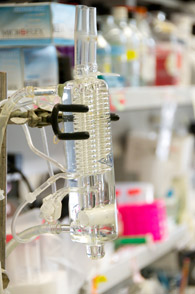
Different from many residency programs, ours will immerse you in research that’s informed by your own curiosity and passion. You’ll not only have the support of a faculty mentor, but the laboratory and computing resources of a major academic medical center.
Our residents have used their research experiences as a foundation for a career of pursuing the great questions of modern medicine. They regularly present their findings at conferences and publish in scholarly journals.
Our physician researchers ask the kinds of questions that help move laboratory discoveries to innovative new treatments in the clinical setting.
Learn more about our department’s research.
The importance of research
Research is an important part of the daily activities of all academic surgeons. The continuing commitment to productive scholarship, embodied by research, as much as a commitment to communicative scholarship, exemplified by teaching, distinguishes the academic surgeon from his/her colleague in nonacademic practice.
The obvious benefit of research to our patients and to the community is improved care. Less obvious but equally important benefits are the atmosphere of open and rigorous inquiry, the constant questioning, and the intellectual stimulation the research programs provide to their participants—faculty, residents, and medical students.
There are numerous opportunities to become involved in basic science and/or clinical research. Those interested in basic science can work in the laboratories of surgical faculty ranging from those in the Transplant, Gastrointestinal Surgery, Minimally-invasive, and Bariatric Surgery divisions to those in the Surgical Oncology and Endocrine divisions. Residents interested in basic science can spend two years in the lab devoted to research, which leads to the development of many projects that are presented at regional and national meetings. Additionally, many of our faculty members perform clinical research and welcome resident participation. Please use the following link for information concerning research within the Department of Surgery.
Our facilities
Our laboratory complex includes animal operating rooms and laboratories, completely staffed and equipped to carry out nine animal procedures simultaneously. Our specialty laboratories include peripheral vascular, gastric motility, analytical chemistry, transplant, neurosurgery, tissue culture, surgical bacteriology, kidney preservation, and shock units. In a typical year, more than 1,000 experimental procedures are performed in the laboratories. The facilities permit study of such experimental procedures as heart valve replacement in large animals and bile duct cannulation studies in guinea pigs and heterotopic heart transplantation in mice and rats. There is also active research in surgical oncology, studying the sequence of mutations and the localization of predisposition genes for cancers.
Finally, the general surgery residency training program allows three of our residents after their PGY2 year to step out for two years. These two years are flexible and can be dedicated to two years of research; a combination of a fellowship and research; completing a graduate degree such as an MBA or a Masters in Medical Education or other practical options. After completing these two years, the resident transitions back into the program at the PGY3 level.